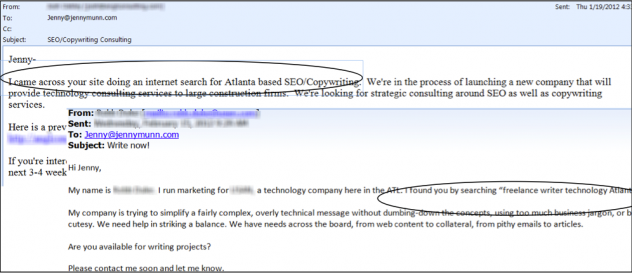Cool guest post from Brett Stone, who sent me this last fall, when she was still a commercial freelancer (and commercial real-estate investor). She’s since moved into some new and exciting directions, leveraging her past experience and teaching women how to raise their wealth consciousness and create more of what they want in their lives. Find out more about it here.
Regardless, this is a great primer on getting out from behind our “boxes,†and drumming up business through face-to-face contact. I’ve always been a fan of more direct, personal approaches to building one’s business—especially as the world gets more and more impersonal and virtual. I subscribe to the belief—as echoed here by Brett—that business-building is about relationship-building. Enjoy!
*********************
When it comes to digging up clients, most commercial writers would prefer to stay behind the computer and let words do the selling of their services. Yet one of the fastest and most satisfying ways I know to build up a client base comes from taking a deep breath, grabbing a handful of business cards, and getting out and networking face to face.
Truth is, with the glut of information out there today, most people would still rather hire someone they already know and like, than spend time sorting through a miasma of avatars on elance, or blindly respond to an unsolicited email.
It’s always interesting to discover just how many people, upon learning I’m a writer, will suddenly launch into telling me about a book they’ve written that needs editing, a direct mail campaign they’ve been considering doing, or that they need help getting some good quality content on their website. Often these people have had a desire for help for a long time, but they just really had no idea where to turn.
The best news about face-to-face networking, though, is that 99% of the time, you’ll be the only copywriter in the room. Yes, you’ll encounter bloggers and people who’ve published an ebook, but rarely is this their main source of income. Just by getting your services in front of someone who needs them and is dreading having to look for it, you’ve already helped them by saving them a big chunk of time. They’ll be so grateful to already know you that, chances are excellent, they’ll hire you.
So though it can be absolutely terror-inducing to stand up in front of a group of 60+ people and plug your business, I’d like to offer a few strategies that can turn face-to-face networking into something that’s not only a successful work-generating activity, but an awful lot of fun.
Finding Opportunities
The first thing you’ll need to do is identify where your clients are hanging out.
Unless you’re just looking for supportive friends to go and have coffee with, don’t go to events for writers. Instead, look for events that target the people who hire you. If you write for ecommerce, then go to events for ecommerce owners; if you write for the natural health industry, go to events for practitioners, etc. You get the idea.
I also attend small B2B events. Even though the attendees there aren’t prospects for my commercial freelancing business, often they serve people who are (such as marketing professionals) and recommend my services to a client they’re already working with.
The Chamber of Commerce is good place to check out, but don’t stop there. If you live in a good-sized metropolis, Meetups.com is a fabulous resource. They have groups focused on all different sorts of interests and businesses. If you don’t find what you’re looking for, you can also start your own.
Many cities also have private companies that sponsor networking events you can attend for a small fee. If you have a little more money to invest, you might also consider attending conferences.
When talking with people, ask what other events they go to, and consider attending yourself. Also, keep your ears open for introductions to mastermind groups. These are little more difficult to sniff out, but a good mastermind group can get you in with highly successful entrepreneurs. These are people that pay good money to farm out writing tasks so they can keep their valuable time focused on growing their business.
Go In With A Plan
At the majority of events, you’ll be asked to stand up in front of the group and introduce yourself and your business. Yes, this is the scary part—public speaking is a greater fear than death for most people—but there are things you can do to allay any anxiety.
The first “must-do†is to prepare. Sit down and write out a script (you’re a writer, right?). In most cases, all you need are three to four lines you can deliver in a clear, friendly way.
Instead of talking about yourself, state your job and then briefly tell people, not what you do, but what you can do for them. I focus my pitch on how my copywriting can help people make more money. Don’t try to be funny unless you’re really skilled at it, and don’t try to engage with the audience unless you’re a seasoned public speaker.
Once you’ve created your lines, memorize them. Stand in the middle of your living room and rehearse, delivering them as if you were addressing a room full of people. As you speak, work towards sounding spontaneous, as if talking right off the top of your head. Be sure to practice standing and gesturing in a way that’s relaxed and natural.
Effective “Minglingâ€
While people are introducing themselves to the group, take note of those who are in positions to hire you or could possibly refer you to people who would. When the evening turns social, make a point of approaching each of these people and making a connection.
This is actually a very easy thing to do.
Simply go up, introduce yourself, hand them a business card, and then ask them to tell you about their business and their goals for it. Don’t talk about yourself unless they ask, and then only in a context that relates to ways you might help them. Don’t sell. Share a little and then show more interest in what they do. Often people will continue to pursue you to write for them without you having to promote yourself at all.
If the people you want to approach are already in conversation in a group, it’s perfectly acceptable to go up to them and join in. Just like you, people are there to make connections and they welcome the burden being off of them to initiate it.
Don’t Forget The Follow-up
The very next day (or later that same day), take ten minutes and send an email to every person you met who you think might become a client or a valuable relationship. In the letter you can comment about the event, tell them it was a pleasure to meet them, ask if they have any ideas how you might help them and refer them to your website.
I usually write one short, friendly letter that I personalize by changing the name and then send out as separate emails.
Often, that follow-up is just the little comfortable opening someone needs to take the next step towards hiring you. Several times I’ve had people write me back and tell me how they’ve been to many events, and I’m the first person who ever bothered to make contact with them afterwards.
The truth is, when it comes right down to it, whether you’re a commercial copywriter or a dog-food vendor, success grows out of forming relationships you nurture by putting yourself out there, and genuinely asking “How may I serve?â€â€¨
Have you had any success with face to face networking?
What are your strategies for creating profitable relationships?
Do you have any events you regularly attend?
What sort of statements do you use to describe your business?
 Brett Renee Stone is a copywriter and investor who specializes in the areas of real estate and ecommerce. Over the years she’s helped her clients raise or generate millions of dollars. Currently, she’s shifting gears, teaching women the process of wealth creation to get more of what they want in their lives. Find out more here.
Brett Renee Stone is a copywriter and investor who specializes in the areas of real estate and ecommerce. Over the years she’s helped her clients raise or generate millions of dollars. Currently, she’s shifting gears, teaching women the process of wealth creation to get more of what they want in their lives. Find out more here.
Want to be a guest blogger on TWFW Blog? I welcome your contribution to the Well-Fed writing community! Check out the guidelines here.


